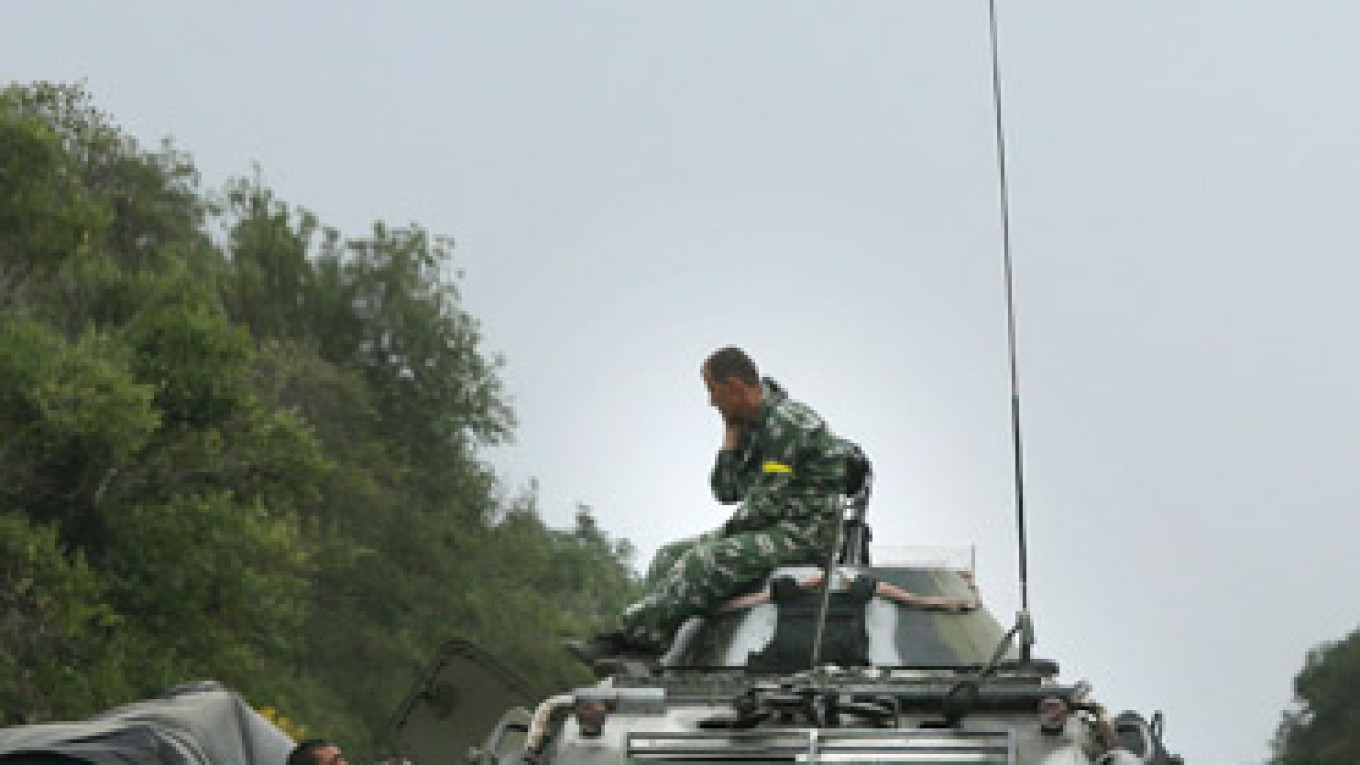Rumors about Moscow's direct involvement in the Ukrainian civil war multiplied Thursday as the pro-Russian insurgents there mounted a sudden and successful counteroffensive in which Moscow apparently had a hand, though it remained unclear to what extent.
The rebels, recently besieged in regional capitals Donetsk and Luhansk, have opened a "southern front" in recent days.
The Ukrainian army confirmed Thursday that it had lost to the insurgents the city of Novoazovsk on the shore of the Sea of Azov, 120 kilometers south of Donetsk.
The separatists said earlier that their goal was to open a corridor to the Sea of Azov and the Ukrainian-Russian border.
The move would essentially end the blockade of Luhansk and Donetsk, opening a potential supply line from Russia.
It would also open a land connection between Russia and Crimea, a Ukrainian peninsula annexed by Russia in March and currently only connected to the new mainland by sea.
Mounting Evidence
Moscow has repeatedly been accused of sending troops and military equipment to the rebels, but denies it.
Ukrainian President Petro Poroshenko said after the loss of Novoazovsk that "Russia has de-facto deployed its troops in Ukraine."
He did not offer hard proof of his claim, nor did Andriy Lysenko, spokesman for Ukraine's National Security Council, who claimed that two Russian tank columns had rolled into the country on Thursday accompanied by Grad missile launchers.
A wealth of circumstantial evidence of Russia's involvement has been cited in recent days, including troops on the border and unexplained soldier burials in Russia.
Ten Russian paratroopers were detained in Ukrainian territory on Monday after reportedly surrendering without a fight. They claimed to be a stray border patrol.
High-ranking insurgent official Alexander Zakharchenko said Thursday that 4,000 Russians were fighting for the separatists — and that some of them were soldiers on vacation.
But he denied the organized deployment of active Russian troops in an interview to Rossia-24 television aired Thursday.
Russian servicemen are obliged to report vacation destinations to their command.
Senior NATO official Nico Tak on Thursday estimated the number of Russian soldiers in Ukraine at about 1,000, The Associated Press reported.
Moscow used "undercover" troops during its takeover of Crimea in March, first denying their presence on Ukrainian territory and only admitting it after the annexation was completed.
The U.S. ambassador in Kiev, Geoffrey Pyatt, said on Twitter on Thursday that Russia was providing state-of-the-art military equipment to the rebels and had recently begun sending its troops into the fray after equipment alone proved not enough to help the insurgents win.
Recent developments "indicate a Russian-directed counteroffensive is likely under way in Donetsk and Luhansk," U.S. State Department spokesperson Jen Psaki said Wednesday, according to the department's website.
Renewed Denials
The OSCE mission on the Russian-Ukrainian border said Thursday that it had not observed any Russian military columns crossing into Ukraine, Interfax reported.
Admittedly, the mission is understaffed to monitor the entire 1,900-kilometer border, most of which is unguarded.
A Kremlin spokesman on Wednesday reiterated the claim that Moscow was not providing the rebels with arms.
He kept silent Thursday, along with Putin and other top Russian officials.
The sole exception was Russia's envoy to the OSCE, Andrei Kelin, who said on Rossia-24 television that no Russian troops were in Ukraine except for the 10 "stray" paratroopers captured this week.
The Russian Defense Ministry dismissed earlier this week reports about any casualties in Ukraine and said it had no troops there.
Defusing the tension somewhat, Poroshenko said Thursday the General Staffs in Kiev and Moscow had held talks on deescalation, including joint border patrols.
The UN Security Council was set to hold an emergency meeting on Ukraine late Thursday, AP reported.
Volunteers, Equipment or Invasion?
Experts contacted by The Moscow Times agreed that Russia was participating in the conflict in some form, but differed on its extent and the military's direct involvement.
Defense analyst Igor Korotchenko, affiliated with Russia's Defense Ministry, said Russian involvement was limited to volunteer recruits and blamed the recent developments on the Ukrainian army's strategy.
The Ukrainian forces overreached when trying to recapture Donetsk and Luhansk in time for Independence Day last Sunday, said Korotchenko, editor-in-chief of National Defense magazine.
Heavy casualties, fatigue and undersupply sapped the governmental forces' strength, enabling the separatists to mount a counteroffensive, he said.
Russian nationalist-minded analyst Yegor Prosvirnin said official Moscow appeared to have ramped up military supplies to the rebels, but doubted the presence of Russian troops in their ranks.
"If there are really tank columns from Russia … the U.S. would have evidence," said Prosvirnin, a frequent Kremlin critic who ardently advocates a Russian invasion into eastern Ukraine.
But Ukrainian political expert Vladimir Fesenko, considered to be close to Poroshenko, insisted that the rebels' victories were due to an inflow of Russian troops.
"A counteroffensive is impossible without new equipment and soldiers to manage it," Fesenko, an expert with the non-profit think tank Penta, said by telephone from Kiev.
"It's a new situation in the region," Fesenko said.
Contact the author at a.eremenko@imedia.ru
A Message from The Moscow Times:
Dear readers,
We are facing unprecedented challenges. Russia's Prosecutor General's Office has designated The Moscow Times as an "undesirable" organization, criminalizing our work and putting our staff at risk of prosecution. This follows our earlier unjust labeling as a "foreign agent."
These actions are direct attempts to silence independent journalism in Russia. The authorities claim our work "discredits the decisions of the Russian leadership." We see things differently: we strive to provide accurate, unbiased reporting on Russia.
We, the journalists of The Moscow Times, refuse to be silenced. But to continue our work, we need your help.
Your support, no matter how small, makes a world of difference. If you can, please support us monthly starting from just $2. It's quick to set up, and every contribution makes a significant impact.
By supporting The Moscow Times, you're defending open, independent journalism in the face of repression. Thank you for standing with us.
Remind me later.


